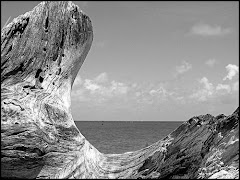
Given this assignment, obviously it began as a little hard to really whittle down the material into one point, one point of significance that we or I could call a touchstone. It then came to me that the most important passage i could conjure would have to be the first. The one i lost my literary virginity to...so to speak. Not in the sense it was the first piece of work that i ever read, rather it was the first i
truly read and more importantly truly
felt, because there is a distinct and profound difference between reading and experiencing a work.
Well the passage i chose is from Sometimes a Great Notion, for those of you who are not familiar it would be hard to appriciate but to give you some insight the story is a modern tragic about an Oregon logging family. The passage deals with the death of Joby, a hilarious character thats hard not to admire for his goodwill and general innocence/ignorance.
I want to go to my new home and put on the clean suntans
Jan's ironing for me and have the twins sit on my belly and
Squeaky show us what she drew today in drawing. And all
them things. I want...cranberries and mincemeat. Oh yeah!
And sweet potatoes with marshmallows-don't laugh- with
marshmallows baked on top and turkey...Don't laugh I want
it
again! Don't you laugh it ain't funny never to taste sweet
potatoes baked with marshmallows on top again!
This point in the story is the first time I felt actually emotionally moved while reading, i must have been in six grade crying over a fictional character during silent reading. The passage is -for me- so sad/hilarious/fear and awe inspiring. The last thing you want to see is Joby die, but its so funny to think that hes about to drown, and he can't stop laughing because he keeps thinking of what a sight it would be to see his cousin Hank blowing air into his mouth, as if they were kissing, he can't get over that. Anyway the only way one could really understand what this passage meant would not be for me to paraphrase, rather to read the text itself.
However, this moment was the first, in which i experienced, rather than read literature.




